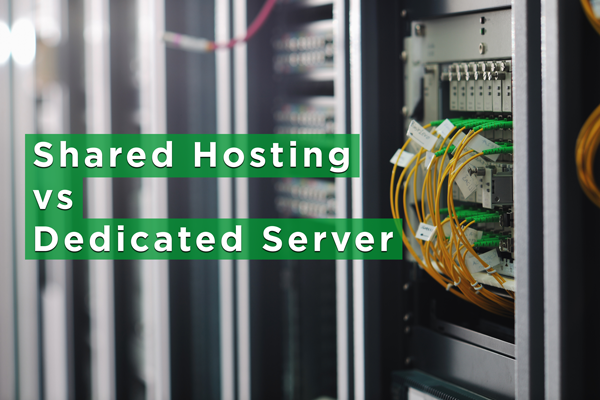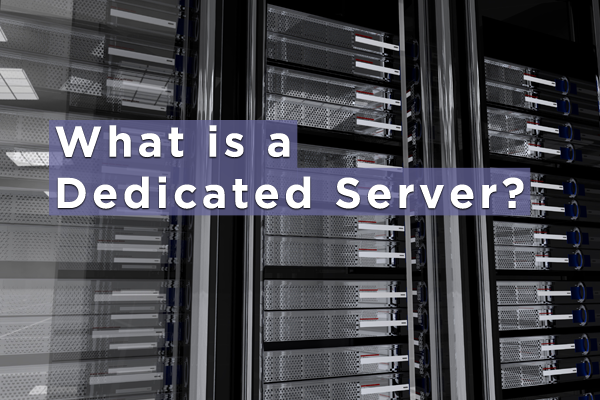Archive for the ‘dedicated hosting’ tag
Cloud or Dedicated Servers – What’s The Difference? no comments

Today’s businesses have several options available when it comes to hosting. Cloud hosting services have become increasingly popular, yet dedicated servers continue to offer the greatest flexibility and customization.
Are you confused about your options regarding cloud computing and dedicated hosting for your business? You need to understand each server type to choose the right one for your business.
Cloud Hosting
Cloud hosting has become increasingly popular in recent years as businesses have looked for efficient and secure ways to store, manage and process their data. The cloud is the delivery of on-demand computing resources over the Internet. A cloud server is a virtual server running in a cloud computing environment. A business migrates its data and applications from its physical servers into the cloud provider’s virtualized servers. Cloud hosting is an ideal solution if you want to enhance your IT performance without incurring huge costs on purchasing infrastructure.
Dedicated Server Hosting
Dedicated servers are known for their high-performing features in processing power and storage speed, are connected to high-speed internet connections, and are hosted in data centers. Dedicated servers can be used for any number of things, some of which is the hosting of websites or database-intensive applications. A good example of this could be CRM systems such as Microsoft Dynamics or SAP. As the name implies, each server is dedicated privately to one customer. That customer receives access to a physical server with the agreed-upon hardware specifications, processing, and storage, all in one unit.
Cloud vs Dedicated Servers
Determining which applications are best suited for your business, whether dedicated servers or cloud hosting, you must keep in mind what requirements and security measures are needed to create the most effective and efficient infrastructure for your business.
What should you consider before choosing a server for your business?
- What are your long-term goals?
- What are your IT requirements?
- What is you budget?
Once you have verified that a server meets your functional requirements you must also make sure you are not paying for anything you will not utilize.
Your primary concern is: What problem do you want to solve?
Hosting Solutions
Not sure what kind of hosting solutions or resources you need? Our team is happy to help you in any way to meet your business needs. Contact TurnKey Internet today and we will help you choose the best hosting solution for your business.
Follow Us :Share :
Shared Hosting vs Dedicated Server no comments
When you are just getting started, a shared web hosting plan is typically enough to help you meet your goals. It gives you a platform to collect leads, showcase your company and sell your products and services. The problem with shared hosting, though, is that it comes with limited performance and limited room for growth. Although it’s enough while your business is still small, you might want to think about upgrading as your business starts to grow. Many people have a hard time deciding when to make the switch, and if you can relate to this problem, then the following information will get you started in the right direction. You will learn about the benefits of using a dedicated server, but you will also get a clear picture of when to take action.
With most shared hosting plans, your performance can be impacted by the way that other people on the server use their resources. If someone else’s website is getting a lot of traffic or being attacked, then your website might slow down or even go offline for a while. If you depend on your site to generate sales, then this downtime is unacceptable. When your customers want to make a purchase, they are not always going to wait for your content to come online again. So any performance issues that you experience can hurt your profitability. A dedicated server will help you avoid that problem by providing you with exclusive resources. A dedicated server also enables your business to customize and configure the performance resources and software based on your company’s unique needs. Things like CPUs, memory, and storage space, can all be customized and upgraded on a dedicated server. With shared hosting, you are limited to the software already installed on the server, and sometimes it may lack a requirement or feature your business needs. But with a dedicated server, you have full flexibility over which software your server runs, even down to the Operating System (Windows, Linux, etc).
Another downside of shared hosting is the lack of Administrative or root access to the server. This limitation affects what software you can install as well as the settings and options that you can configure on the server. This can greatly impact the potential of what you are able to do with your website. However with a dedicated server, you do have full root or admin access, giving you the ability to better monitor and troubleshoot your website, with full access to your virtual server’s logs. With a dedicated server, you have exclusive access and can dictate who shares that access. This allows you to better secure the contents on your server and alleviates the concerns of sharing a server with malicious or careless users. Also because you have full control over the server, you can better enhance and customize its security based on your unique needs.
If you have decided that you need to upgrade, then consider it a good thing. Needing more resources means that your business is growing and that you are attracting plenty of new customers. Having a dedicated server will help you accommodate even more web traffic, and you will not need to worry about losing sales or customers due to downtime. The speed and performance of a dedicated server will also help you maintain a professional image, which will enhance and preserve your reputation. Some business owners procrastinate when they need to upgrade their website, but doing so hurts them more than they likely suspect. Ensuring that your web hosting solution is capable of meeting your needs is a vital factor when it comes to getting the most from your business, and you can get started right away.
What is a Dedicated Server? no comments
A dedicated server (also known as a bare metal server) offers the ultimate combination of performance, value and security for your web hosting needs. A dedicated server provides you with exclusive access to all the physical hardware in the server (CPU, Ram, Disk, Network Port, and the physical chassis of the server). Nothing on the server is shared with any other clients in any fashion.
For most clients with a new website or business, a Shared Hosting solution is enough to get off the ground. But, for many there comes a point when shared hosting just isn’t enough. The most obvious sign that it’s time for an upgrade is when your website has started regularly requiring more bandwidth or resources than your current plan provides. If your business increases in popularity, thus suddenly sending more visitors to your website, it could temporarily go offline. However, upgrading your shared hosting to a dedicated server can prevent this.
Regardless of the content of your website, if you’re worried about stability, a dedicated server is always the safest bet. Below you will find a summary of all the benefits a dedicated server provides.
Performance
Server and network response times in a shared hosting environment depend highly on the activity of other users and websites with whom you share space and resources. With a dedicated server you have significantly faster response and page load times because all the systems resources (such as CPU, disk, RAM and network bandwidth) are controlled and utilized solely by the applications on your server.
Reliability
With a dedicated server, you have unlimited access to the operating system, server resources and software applications. This gives you a reliable way to manage the needs of your website and users: it’s all there when you need it.
Security
Dedicated servers provide better security than any other form of hosting since you are the only one with the root “administrative” access to your resources and can configure customized security policies, such as firewall protection, user-level permissions and even restrict the types of applications that run on the server. With shared hosting, the users you share space with could jeopardize the security of your website and data.
Customization
Dedicated servers offer unlimited customization and flexibility to meet your hosting application needs. You have access to fine tune and optimize all aspects of the server such as custom versions of Apache, PHP, MySQL, or custom database configurations to suit your application needs, providing substantial performance gains over any other form of hosting. You can install, remove, or modify any applications you wish.
Dedicated servers are the best solution for those that are serious about their web site and want the assurance that hardware, software and resources are dedicated exclusively to them. If you are considering hosting numerous domains, a high traffic site, an e-commerce site, have sensitive data contained in your site or simply want more speed, power and control, it’s time to upgrade to a dedicated server.
Dedicated Server: 4 Reasons Why Your Business Needs One no comments
Both large and small businesses are faced with a wide variety of choices and options when it comes to finding a server and hosting solution for their website, company email and data. One option is shared hosting, in which a single server’s resources are shared by a number of different websites and users.
However, if you’re a business looking for more power, control, and flexibility, the solution for you may be a dedicated server. With a dedicated server, your business has exclusive use of that server’s resources. You also have the flexibility of customizing the server’s CPU, RAM, and disk space based on the needs of your business.
Let’s take a look at 4 specific advantages of choosing a dedicated server:
No Shared Resources
When using a dedicated server, every bit of power, storage, and bandwidth is exclusive to you and no one else. Not only will this give your business more room to work with and expand, it will also prevent issues with your site caused by other websites. For example, if you’re site is hosted on a shared server where there is another website that is being attacked or hogging up resources, this can affect the performance of your company’s site.
Flexibility & Customization
A dedicated server allows your business to customize the hardware and software based on your company’s unique needs. Things like CPU, Memory, Hard Drive, even the speed of the server’s network port, can all be customized and upgraded on dedicated servers. With shared hosting, you are limited to the software already installed on the server, and sometimes it may lack a requirement or feature your business needs. But with a dedicated server, you have full flexibility over which software the server runs, even down to the Operating System.
Administrative / Root Access
Another downside of shared hosting is the lack of Administrative or root access to the server. This limitation affects what software you can install as well as the settings and options that you can configure on the server. This can greatly impact the potential of what you are able to do with your website. Another advantage of administrative/root access is the ability to better monitor and troubleshoot your website, with full access to the server’s logs.
Dedicated IP Address
Each dedicated server comes with its own dedicated IP address. With shared hosting, your site may be sharing an IP address with multiple websites. If your website happens to share an IP with a site that spams or contains malware, this can cause multiple problems. Your website can end up getting blocked, your email rejected as spam, even your search results can be affected. Another thing to consider is whether or not you’ll be running an e-commerce or selling things on your site. If so, you will need to have an SSL for your site, which in turn requires a unique dedicated IP.
Now if you’re worried that you’re not tech savvy enough to run your own dedicated server, consider the option of going with a Managed Dedicated Server solution, which will provide many additional benefits on top of what’s listed above. Also if cost is a concern, check out our latest ‘Best Value’ Dedicated Servers. There are countless other advantages to using a dedicated server, however the 4 above are some of the most notable. So before you decide to host your website on a shared server, consider the added flexibility, reliability, and performance that only a dedicated server can provide. Follow Us : ![]()
![]()
![]()
![]()
![]()
Share : ![]()
![]()
![]()
![]()
![]()
FBI Wants Records Kept of Websites Visited no comments
I tend to do a lot of Facebook and Google stalking. Type in the name, see what he or she has been up to, and clear history. It’s pretty harmless and who is going to find out anyway? What, the FBI? Really? Yes, really. The FBI is pushing to have ISPs keep detailed records of what web sites customers have visited for up to two years.
FBI Director, Robert Mueller is asking Congress to make it mandatory that Internet providers store users’ “origin and destination information.” Along with the FBI, this idea is popular with state computer crime investigators. Both groups believe that logging user history would help with investigations of child pornography and other serious crimes.
Since 1986, phone companies have been required to keep a record of “the name, address, and telephone number of the caller, telephone number called, date, time and length of the call” for a period of 18 months. Greg Motta, chief of the FBI’s digital evidence section, is arguing that this new act is merely an extension of call logs and is necessary for the FBI to adapt to the newer technology.
The details of the proposal are still very vague. It has not been decided whether Internet providers would need to log IP addresses, domains, host names, or actual URLs of the sites visited. If the FBI insists on the fourth possibility, there could be serious legal implications. Recording URLs visited would most likely be considered deep packet inspection, a violation of the Wiretap Act.
Another problem is practicability. Eighteen million website page hits occur every hour. Multiply this by 24 hours by 700 days and you have a ton of data. Sorting through this would be very time consuming and might not be worth the possible advantages.
The Justice Department is currently weighing the positives and negatives of such a law and, as of the writing of this article, does not have an official position on data retention.
The SEO Show no comments
I don’t know about you but I’m getting kind of sick of SEO. Obviously it’s an incredibly important thing to know about when it comes to marketing. Getting your website to come up on searches is probably the single most important element for fiscal success. But how possible is it for one person to make that happen? Are SEO techniques really that helpful and, if so, why do they seem like such a mystery? And then, of course, there is the topic every discussion of SEO must inevitably broach: what of that slippery Google algorithm that seems to change every other week?
If I got paid for every clown who claims to have THAT figured out, I’d be a very rich woman.
Steeped in mystery, Google’s algorithms determine, based on nobody really knows what, which sites rise to the top of searches and which sites disappear into obscurity. And of course, just as they claim to understand the algorithm, thousands upon thousands of professionals claim to be able to help you “optimize your SEO” within it—to crack the enigma code anew, just for you, for $39.95. Surely there are plenty of legitimate professionals who really do have some idea of how to use this system. They are the real experts. You can find them wherever the big bucks are sold.
For the rest of us trying to make it, what do we do? Who do we trust? How can the individual marketer sift through the malarkey and find the real SEO tips and tricks that will improve page rank? Well, for a one-time payment of $39.95…
Just kidding.
In my experience, if you’re willing to put in the time, to experiment with all of the various techniques on all of the various blogs, it *is* possible to improve your rank. It won’t happen immediately. You won’t be number one on the Internet, but you WILL improve and that improvement can be significant. Here are the four tricks, courtesy of real live SEO expert Cal Hesson over on hostingdiscussion.com, that have helped me get TurnKey Internet higher up in the charts:
(1) Keyword Phrase Research and Analysis
Identify the keyword phrases that people are using to find your products and services. This can be done in several ways, many of which cost money. There are, however, lots of tools that are free or relatively inexpensive, that can fill you in on your analytics. Google Analytics is one that many swear by. Here at TurnKey we already had an analytics tool installed on our servers. I used that.
(2) Study the Competition
Pay close attention to who holds the top 10 positions for the keyword phrases you want to target. You need to look at your competitions On-Page SEO (the text and content of their pages) and their Off-page SEO (the inbound links, etc., that contribute to site ranking). Part of the Off-page SEO analysis is counting the back links to your competitor’s web sites. You’ll have to either get more or better back links than they have.
(3) Good On-Page SEO
You need to pay very close attention to the titles, keywords, descriptions, body content, etc., of your site. The search engines have to really understand what your web site is all about, and good, editorially sound content provides that. The good news is: you have complete control over this content.
(4) Back Links
As the title implies, for a good SEO profile, good back links are essential. There are myriad ways of getting back links, although understanding what good back links are has become more difficult as Google continually changes how they are valued.
There you have it: a quick and dirty set of simple tips for improving your site ranking. Sure, there are trade secrets to SEO and, if you really want them, I’m sure you can find someone who will take your money. Barring that, why not do what I do? Dedicate yourself to the process, take the time, follow these rules, read all you can and figure out those secrets for yourself. To your success! Follow Us : ![]()
![]()
![]()
![]()
![]()
Share : ![]()
![]()
![]()
![]()
![]()






